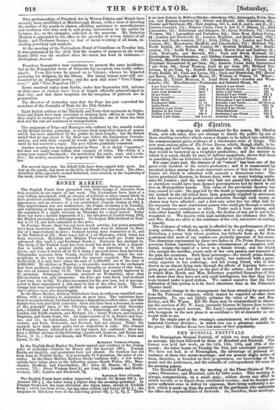t 4tatrro.
Although in reopening his establishment for the season, Mr. Charles Kean, now sole ruler, does not attempt to dazzle the public by one of those startling novelties which cause a theatre to be talked into celebrity, his commencement gives evidence of a wholesome state of things. The new semi-serious piece of The Trivia .Donna' which, though slight, is in- teresting and well written, is put on the stage with all the carefulness that would be bestowed on a weightier production; and the manner in which it is acted, chiefly by stars of inferior magnitude, shows that there is something like an histrionic school founded in Oxford Street.
For some years past, the absence of all "school" hoe been one of the great evils incident to the actor's profession ; and it is enumerated by practical judges among the most important causes of that decline of his- trionic art which is admitted with scarcely a dissentient voice. The better provincial theatres, in former days, were so many training acade- mies for London and the actor who had d not passed his ordeal at Bath or elsewhere would have been deemed presumptuous had he dared to set foot on Metropolitan boards. This value of the provincial theatres has long ceased to exist : the gaps left by the death or superannuation of art- ists trained in the old school have been generally supplied by successors who have received their professional education through such means as chance may have afforded ; and a first-rate actor has too often had for his successor the most convenient person who could get through a certain line of business—somehow or other. Under such a loose system, and with other baneful influences at work, the decline of any art is not to he wondered at. We receive with high satisfaction the evidence that Mr. and Mrs. Kean are alive to the existence of the evil, and active in seeking a remedy.
The evidence of which we speak is afforded by the performances of two young artists,—Miss Heath, a debutante new to any stage ; and Miss Robertson, a young lady whose position has hitherto been so far from- prominent
that most of our readers are probably ignorant of her name. The characters represented by these two ladies in The Prima .Donna are a generous Italian cantatrice, who, under circumstances of excessive self- denial, resigns the hand of a lover to a female friend; and the friend who accepts the sacrifice, aware only of her own passion and innocent of the pain she occasions. Both these personages—the stately prima donna,. wounded both in her love and in her vanity, but endowed with a gene- rosity superior to her sufferings, and her young friend, who is first shown in an almost dying state through the effects of hopeless love—re- quire great care and delicacy on the part of the artists ; and the manner in which Miss Heath and Miss Robertson acquitted themselves of this task shows that they have not only good intelligence, but that they have been trained under a good system. We cannot conceive that the local habitation of this system is to be fixed elsewhere than in the Princess's Theatre itself.
The recent change in the management has been attended by secessions from the Princess's company, which cannot be regarded as other than lamentable. No one can lightly estimate the value of Mr. and Mrs. Keeley, and Mr. Wigan. But Mr. Kean may be congratulated in obtain- ing the services of Mr. W. Lacy, precisely because he knows how to tarn those services to good account. Mr. Lacy's representation of a fashion- able bourgeois in the new piece is as excellent a bit of character as one would wish to see.
For the staple part of the evening's entertainment, we have still the immortal Voridcan Brothers ; in which (we use a grammar suitable to the piece) Mr. Charles Kean have loot none of their popularity.


























 Previous page
Previous page